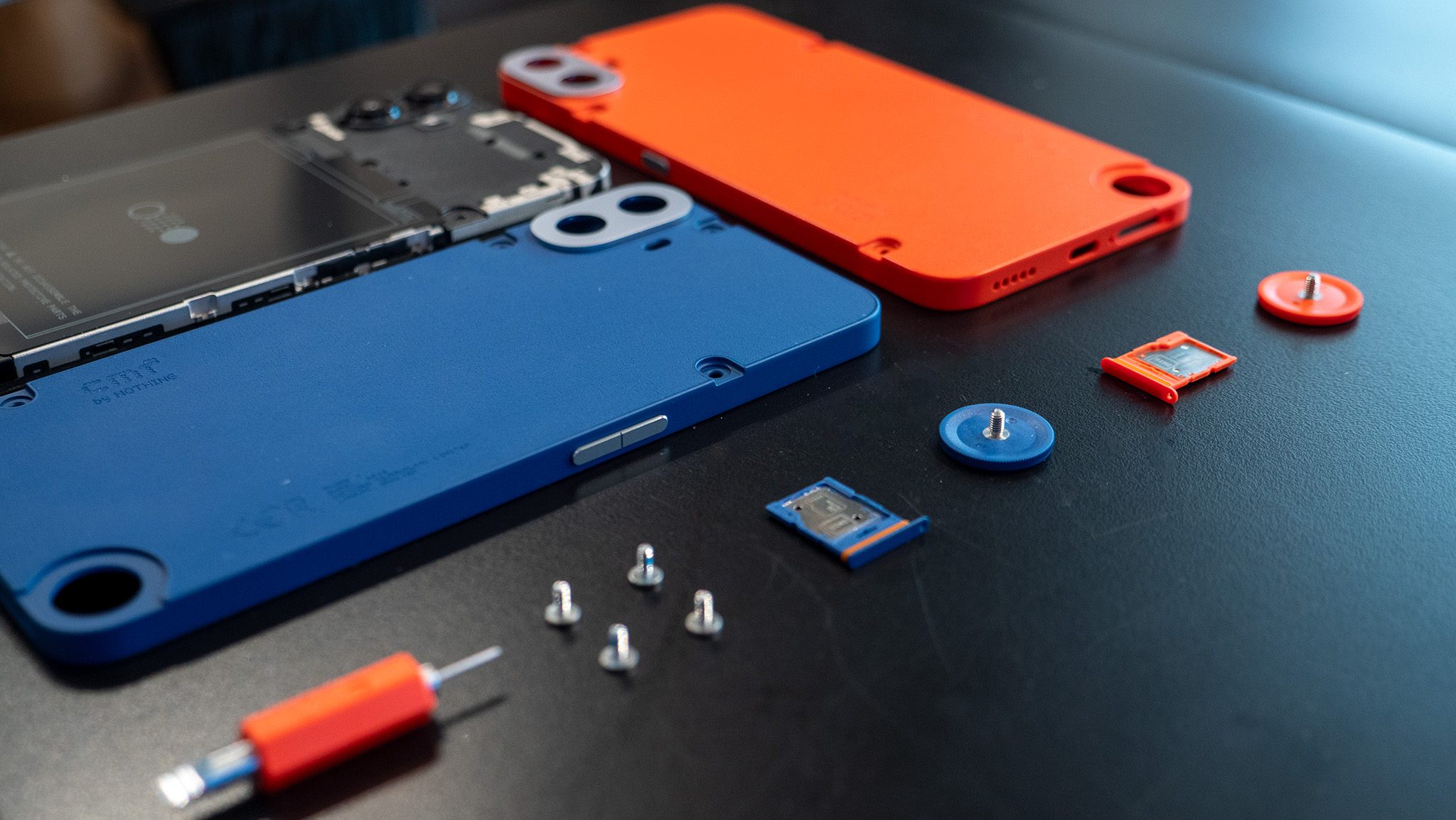How companies used CES 2021 to show off wild new health tech for a Covid world
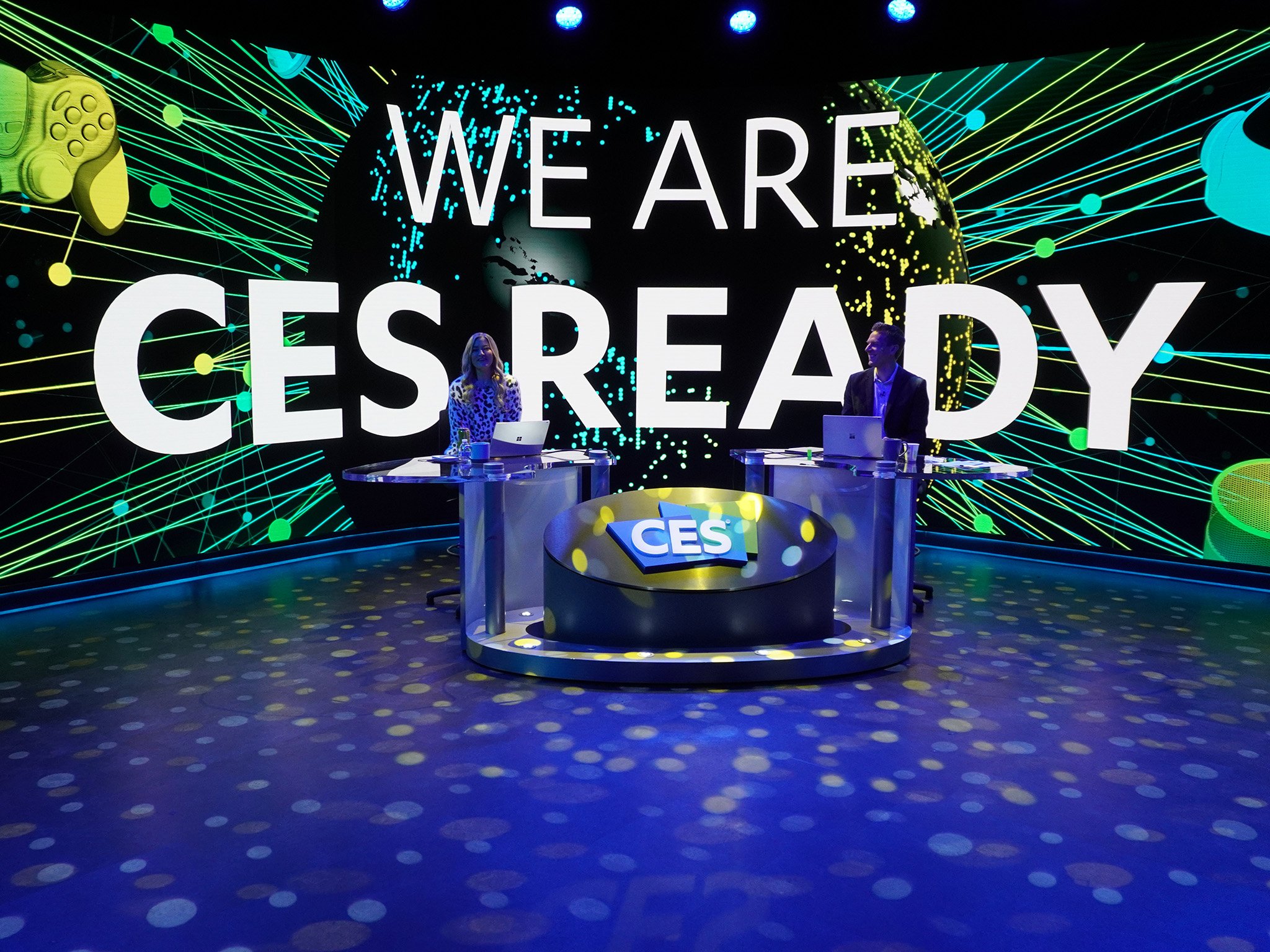
There's no question that COVID-19 has impacted every aspect of our lives for the last year. Along with having to take several safety precautions, many of us are also working from home, some for the first time. Kids are going to virtual school. Meetings are being held online using services like Zoom and Google Meet. And trade shows are virtual, too. That includes the largest North American trade show for the tech industry, CES, which, because of COVID-19, switched to an entirely digital format for CES 2021.
Along with physical booths being replaced by clickable icons and video and text-based chats becoming the alternative to in-person conversations, COVID-19 also re-shaped the types of products that manufacturers, big and small, are developing and showcasing at CES. Not surprisingly, there was a lot of health tech at CES.
Purify the air
One of the new key focuses at CES 2021 are devices designed for helping clean the air, ridding it of bacteria and viruses. Products like air purifiers are not new: they have been in homes and businesses for many years, especially beneficial for those with allergies, asthma, and/or pets.
But at CES 2021, there's a burgeoning category of personal and portable air purifiers you can take with you. It likely won't be uncommon in the future to see these gadgets on tables at restaurants and coffee shops, keeping the immediate air around you clean while you enjoy a meal or drinks with friends, or to see one at every desk in an office.
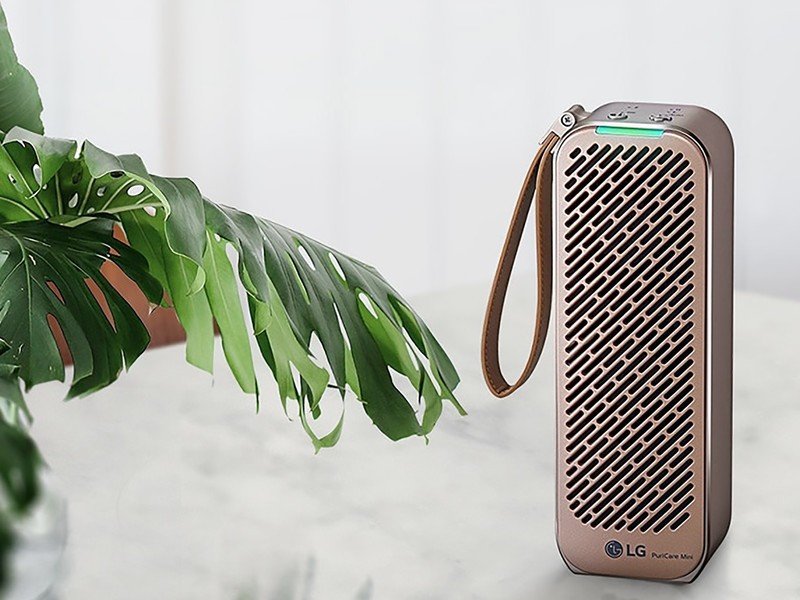
Both small and large companies are getting into the trend. LG, for example, touted its PuriCare Portable Mini Air Purifier which runs on a rechargeable battery and can pop into your backpack to use at the office, local coffee shop, airplane, or even while going for a walk outside. It operates at low noise so it won't be distracting and can remove up to 99% of harmful substances from within your personal area. Check the air quality using the companion app or by referencing the color of the smart display: green is good, red is bad.
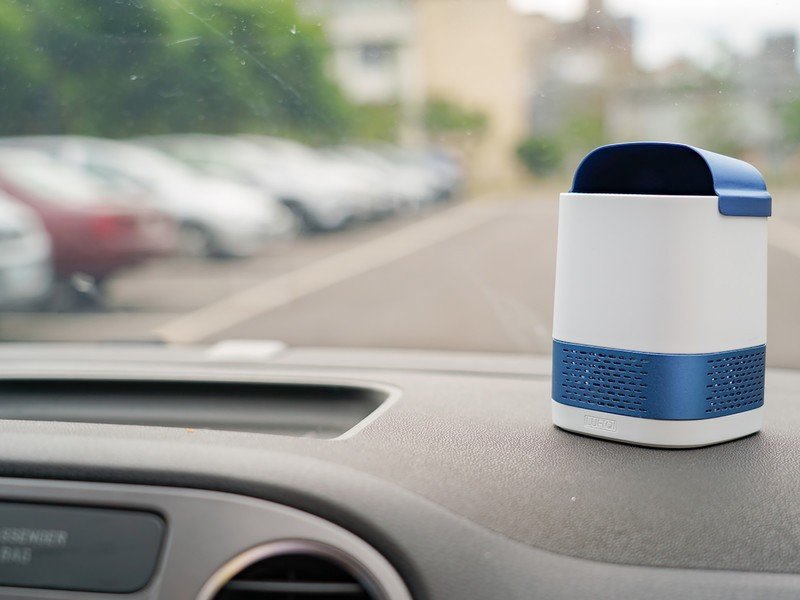
LUFTQI is a smaller company getting into the same business with its LUFT Duo Personal Air Purifier. It can similarly rid the air within a 240-square-foot space of pollutants, viruses, germs, and bacteria using its patented technology that the company says can capture and decompose pollutants that are typically too small for typical HEPA filters.
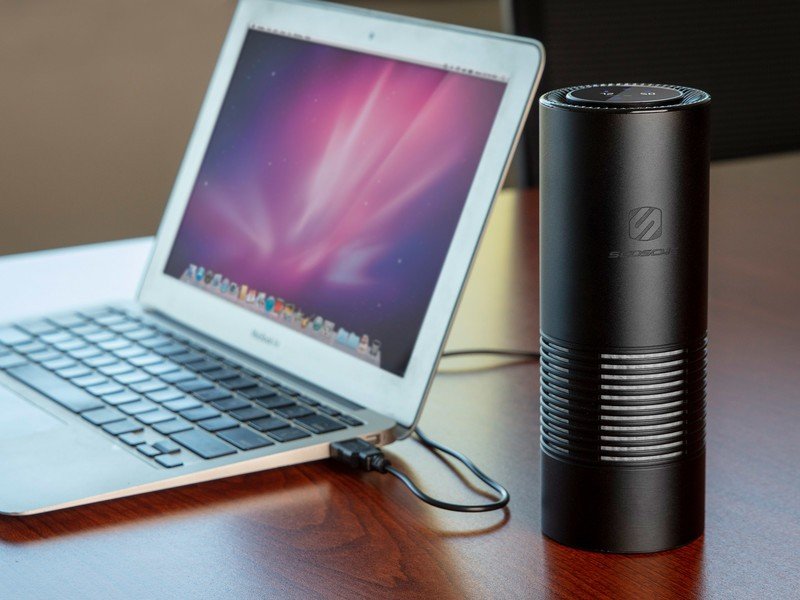
Scosche is always at the cutting-edge of tech innovation at CES, and this year is no exception. The company has a purifying device that's designed for use in the car, though it can also be used in other spaces, like an office cubicle. Called the FrescheAir Portable HEPA Air Purifier/Deodorizer, it fits into a car's center console cup holder and is motion activated. Once you plug it in and it realizes you're inside the vehicle, it will begin not only purifying but also deodorizing the air using one of two fan speeds. The digital display, meanwhile, reports current air quality, temperature, and humidity. It comes with a replaceable HEPA filter (replace every six months or so) and dual 12-watt USB car charger and charging cable.
Be an expert in 5 minutes
Get the latest news from Android Central, your trusted companion in the world of Android
While air purifiers saw a rise in sales during the pandemic as people began to look at ways to breathe cleaner air at home, COVID-19 will lead to growing interest in purifying on the go as well. CES will continue to be the hotbed for introducing clever new ways to do this, whether it's through pocketable, or even wearable, devices going forward.
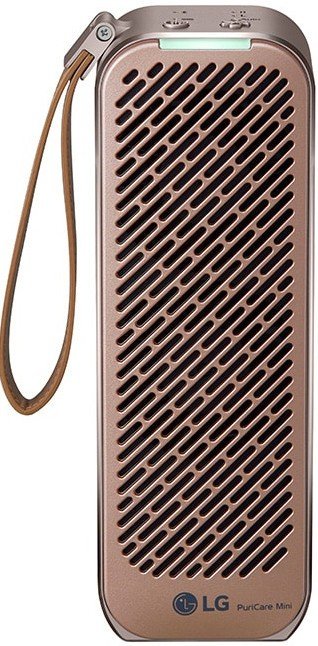
Clean the air while on-the-go
Bring this portable air purifier with you everywhere to keep the air clean as you walk, enjoy a coffee at the local shop, hop on a plane, or get work done at the office. It runs quietly at just 30dB and the battery lasts for up to eight hours per charge. Certified by both Intertek and the British Allergy Foundation, it can remove 99% of ultra-fine dust particles.
Sanitize just about everything
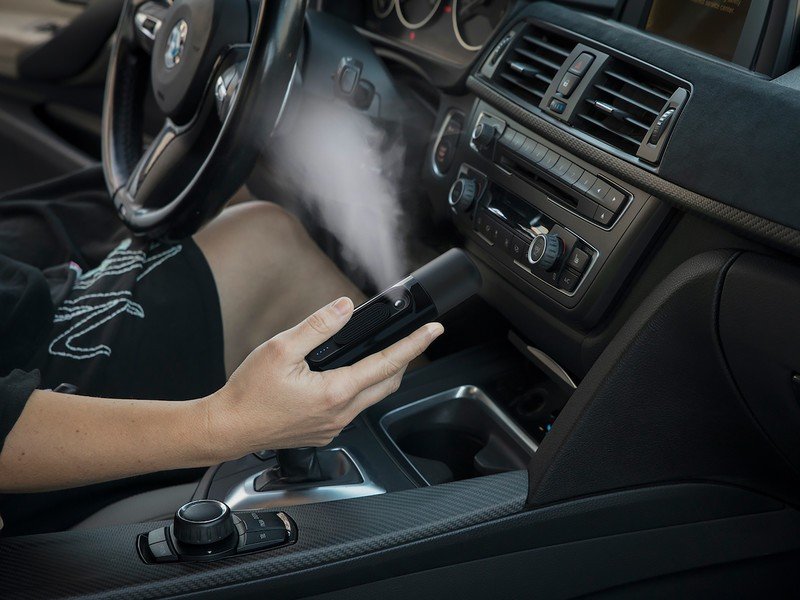
Usually, when the topic of sanitizer comes up at CES, it's because someone is reminding you to use some after every hug, handshake, or one-on-one product demo or interview. Why? To help prevent you from catching that dreaded "CES flu" — the cold anyone who has ever attended CES knows you'll likely get within the week of arriving back home. It's difficult to fend off after those hundreds of handshakes and hugs, ardine-like crowds clamoring to check out Samsung's gorgeous 150-inch microLED display, and close-quarter conversations where sneezes, coughs, and aggressive talking can easily spread germs from one person to another. Thus, hand sanitizer has always been a must. But sanitizer hasn't been on display. Until now.
As a result of COVID-19, "sanitize" has become a buzzword at the show, and plenty of products that take the action to an entirely new level are being introduced.
Basic screen cleaning solutions have always been a big part of CES: it's not uncommon to find people lining up at a booth like WHOOSH! for a free smartphone screen cleaning with a safe, antibacterial solution. One study found that viruses like COVID-19 can survive on a phone screen for almost a month, after all!
WHOOSH?, a leader in the space, has expanded its focus this year by showcasing the Sanitech powered by Halo OX at CES 2021, a device and surface sanitizer – not just cleaner – that is a broad-spectrum disinfectant. Safe to use on all touchscreen glass, it can help eliminate infectious organisms in bacteria in half a minute, thus reducing the growth of microorganisms on treated surfaces by 99.99%. It works the same as any standard cleaner: spray and wipe using a microfiber cloth. It's odorless, with no added dyes, VOCs, or fragrances; and it's hypo-allergenic, non-corrosive, and 100% biodegradable, making in eco-friendly as well.
Scosche, once again, has an interesting innovation in this space with its MagicFogger, a handheld device that sprays a mist of FDA-approved HOCL Electrolyzed Water that it calls MagicFog. The solution attaches to, attacks, and kills a variety of germs and viruses, and is said to be 100% organic, so you don't have to worry that it could harm a person, pet, or the environment. Ideal for use in the car, office, school, restaurant, or airplane, it can kill 99.94% of microbes and Scosche says it is "highly effective against viruses." Powered by a 3,200mAh rechargeable battery, the reservoir can hold up to 1.5 ounces of the solution and the device will come with an 8-ounce bottle to get you started (order more online as needed.) It's scheduled to be available in Spring 2021.
One category that is always huge at CES is screen protectors and phone cases. That hasn't changed this year, but COVID-19 has shifted the trend in a different direction. No longer are screen protectors being touted primarily for their ability to protect your phone's screen from shattering if you accidentally drop it, or to prevent fingerprints from gathering on the surface, they're being promoted for their anti-microbial properties instead. The Axiom Anti-Microbe ScreenFilm, for example, is a self-healing membrane that adds anti-microbe properties to fend off viruses and germs from the surface.
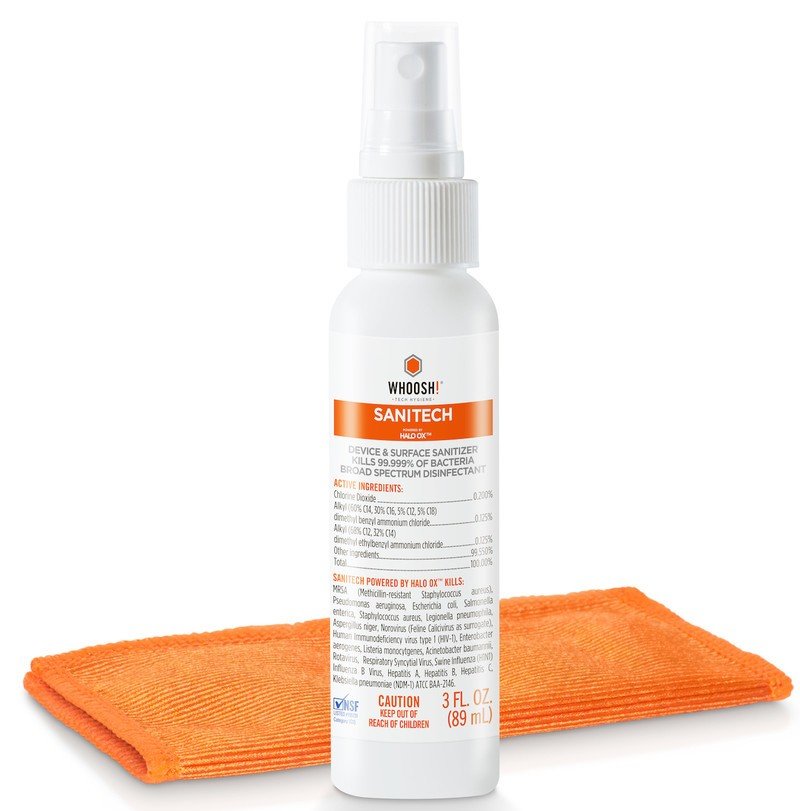
Keep device screens sparkling clean
Just spray and wipe this disinfectant onto any touchscreen, from your smartphone to your tablet and laptop, to prevent the growth of bacteria on the surface. It's safe to use on virtually any glass screen. Plus, it's 100% biodegradable so you can feel good that using it won't harm the environment. In addition to touchscreens, you can use it on virtually any treated surface: there are no added dyes, VOCs, or fragrances.
Let there by UV light
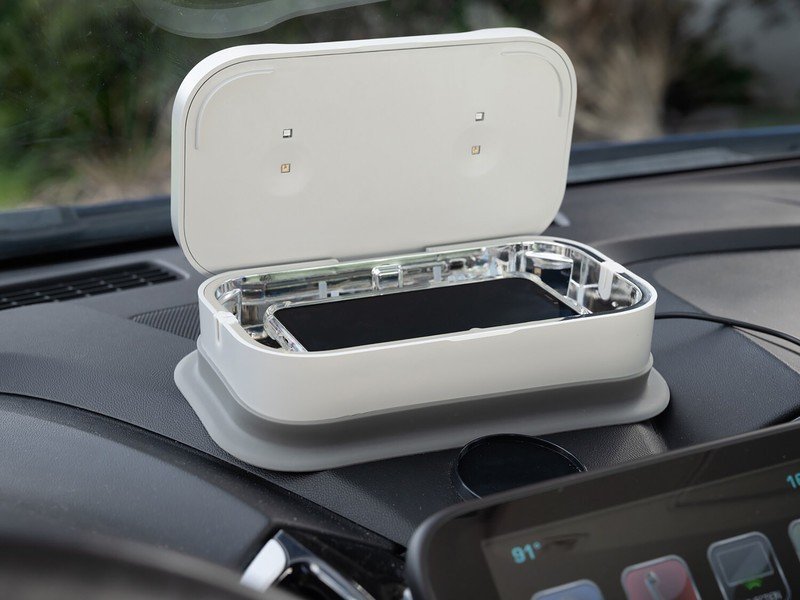
Phonesoap made waves at CES with its UV-based phone sanitizer (first shown on venture capital reality TV series Shark Tank.) Now, the device is found in homes, retail locations, and even hospitals all over, and it has sparked a number of similar products from brands like Homedics, Mophie, and Coral.
But that has always been a fairly small category of product at CES — you might find a handful of such sanitizing devices littered throughout the show floor. This year, however, a large percentage of e-mail pitches and virtual booths are focused on UV-C light products that sanitize high-touch surfaces and devices.
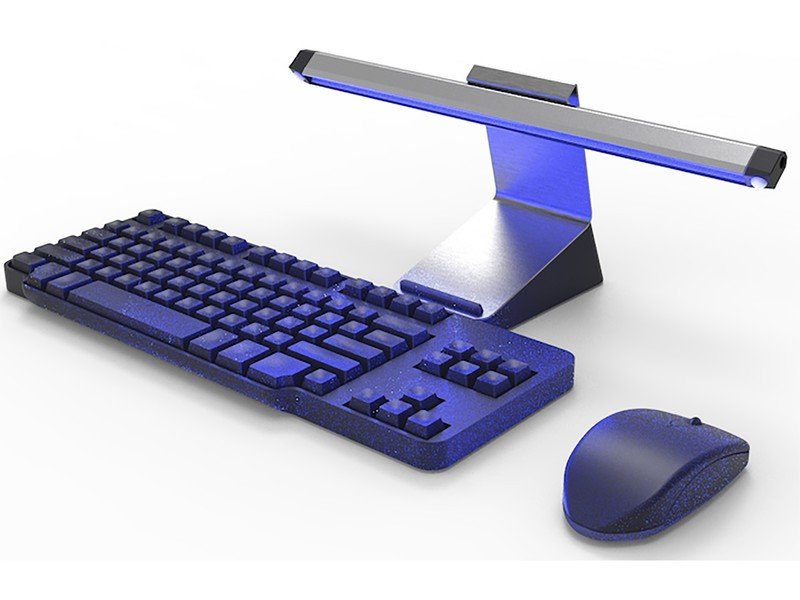
Targus, for example, plans to launch its UV-C LED Disinfection Light in Spring 2021. Position it on your desk at the office and it will turn on once per hour, to disinfect devices like your keyboard and mouse, for five minutes at a time. If the built-in motion sensors detect that you are still working, it will try again after five minutes of inactivity. Not only can it help keep high touch surfaces clean, the process is also a great reminder to periodically get up, move around, stretch, and take a break.
Similar to Phonesoap, the Utilimedic America UV8LED In-Car Phone Sanitizer and Charger is designed specifically for use in the car. Use it to disinfect your smartphone, along with a credit card, keys, and even face mask, so everything is fresh and clean by the time you get home from the grocery store. It, too, uses UV-C light to fully sanitize anything you put inside, eliminating up to 99.9% of germs, viruses, and harmful bacteria in five minutes. As a plus, it can even recharge a second Qi-enabled phone wirelessly on top; and rubber cord slots on either side allow for an Apple CarPlay or Android Auto connection while the phone is being cleaned.
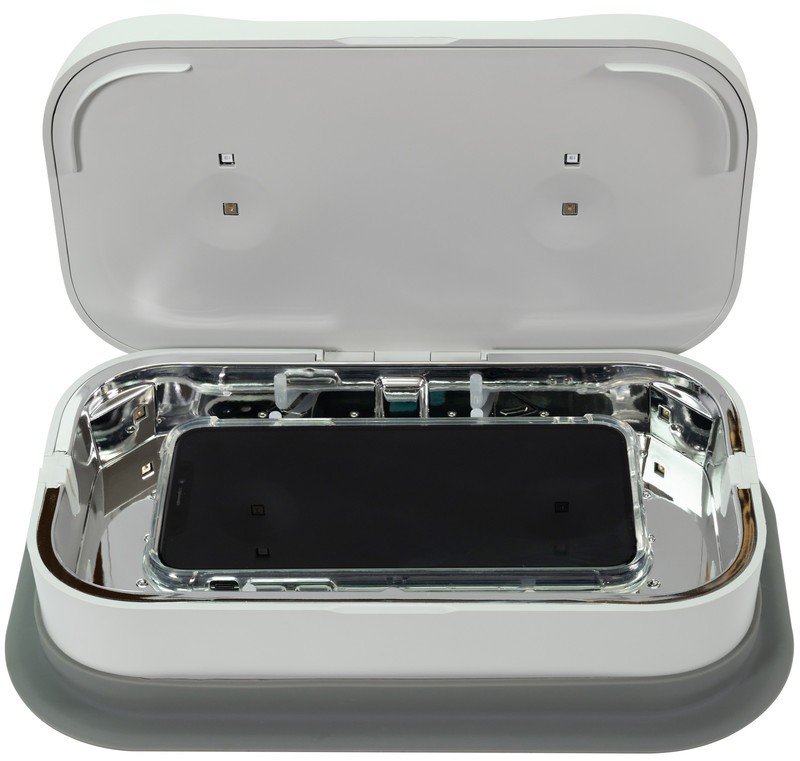
Sanitize while you drive
After hitting up the local grocery store to grab your week's supply of food, pop your smartphone, keys, credit card, and face mask into this handy UV-C sanitizer and let it do its thing, disinfecting everything in about five minutes so it's all clean by the time you get home. It can also charge up to two phones, and accommodates even the largest smartphones, with or without a case.
Mask up!
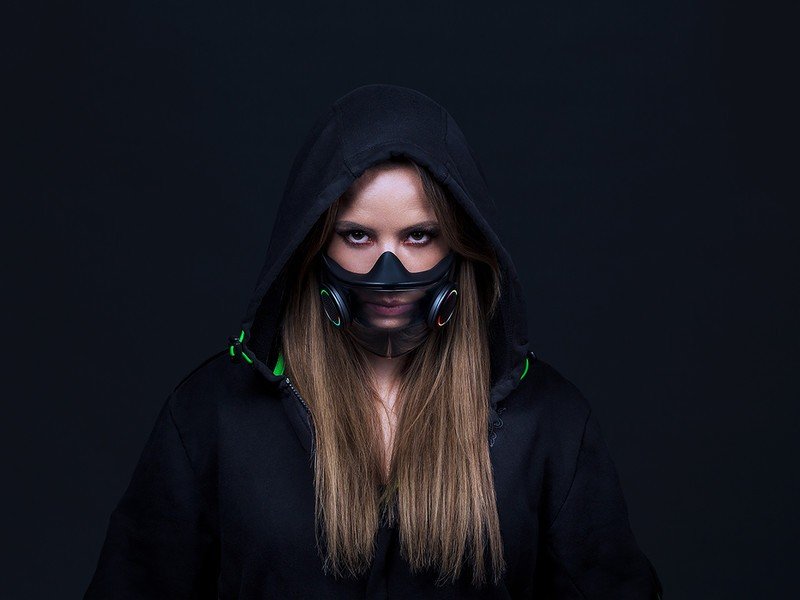
The one area of "tech" that has never before been part of CES but is dominating the headlines this year is that of face masks. Because of COVID-19, it's essential that we all wear face masks any time we go into a public place or meet with people outside of our immediate family where social distancing can't be maintained.
Usually, people have opted for fashionable cloth, disposable, or medical-grade N95 masks. But the tech industry has jumped in with both feet and come up with clever solutions to some of the most common pain points.
The most talked-about mask from the show is Razer's Project Hazel, which is still in the prototype stage but offers compelling features. Providing sufficient protection via the surgical N95 respirator, it also includes a detachable ventilator to help regulate airflow. It comes with its own UV charging case (there's that UV technology again!) for sanitizing and sterilizing it after wear, while also recharging the internal battery.
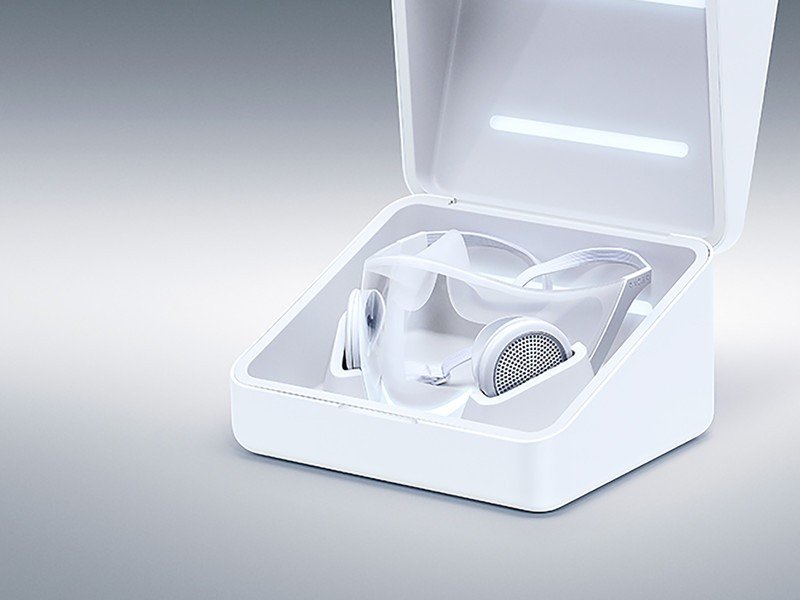
The coolest part, however, is that the front is transparent, so people can see your lips move when you talk or the crinkle at the sides of your mouth when you smile. A built-in mic amplifier, meanwhile, uses patent-pending technology to amplify speech so they can also hear you better. Sure, you might look a bit like the DC Comics character Bane (and maybe even sound like him.) But if masks become a normal part of everyday life for the next year, or longer, this product and others like it could take off.
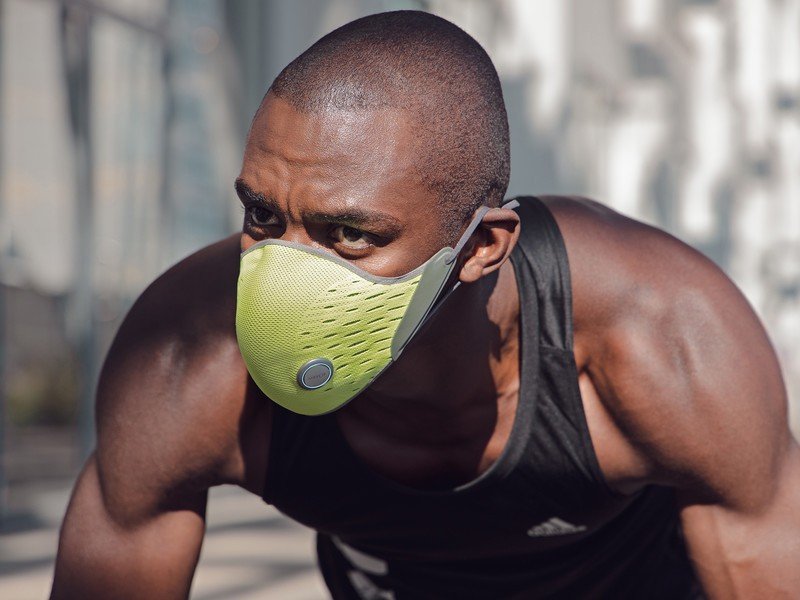
The AirPop Active+ Mask with Halo Sensor is designed mainly to wear while exercising or playing sports, with a focus on tracking air quality and breathing rate. Data about the air quality around you can prompt you to find another spot to work out so you don't breath in harmful pollutants and viruses, especially when you're breathing heavily during a cardio workout in the park or running on the treadmill at the gym.
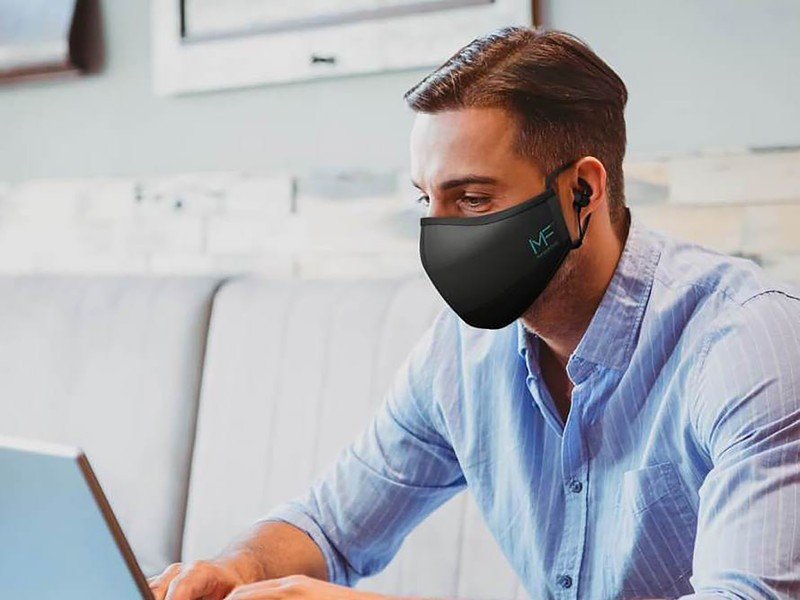
Also aimed at active folks is the MaskFone, which adds wireless earbuds on either end of the ear straps. Pop them into your ears and listen to tunes while working out or going for a walk or run while still staying safe. It also has a built-in mic so you can check in with your spouse about what you need to grab at the grocery store while remaining hands-free. The mask itself is not FDA-approved but it does work with removable and replaceable PM2.5 and N95 filters.
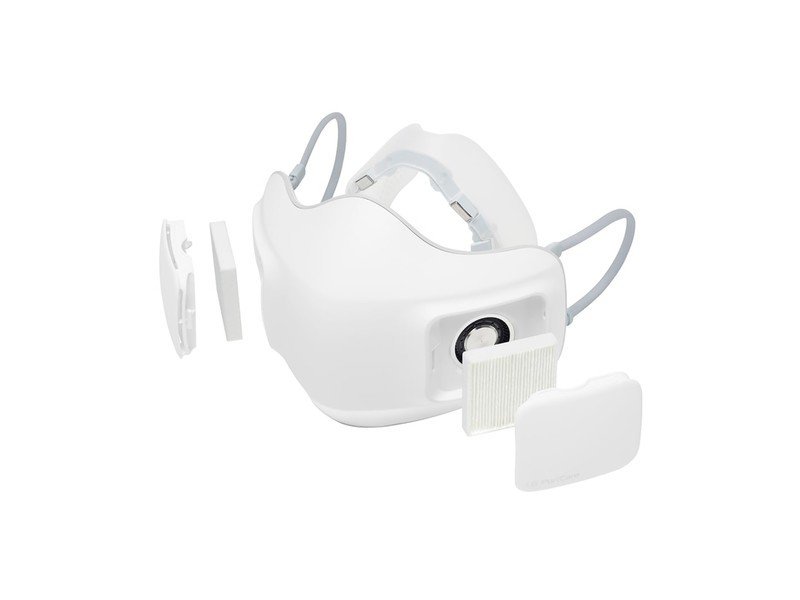
Established brands like LG are also throwing their products into the mix. LG's PuriCare Wearable Air Purifier is just that – an air purifier as well as a protective face mask. Using HEPA filters, dual fans, and a patented respiratory sensor, the idea is to help you breathe better. As someone who wears eyeglasses, an appreciated feature is that minimizing air leakage also means your eyeglasses won't fog up. Finally!
Work from home, play at home gear
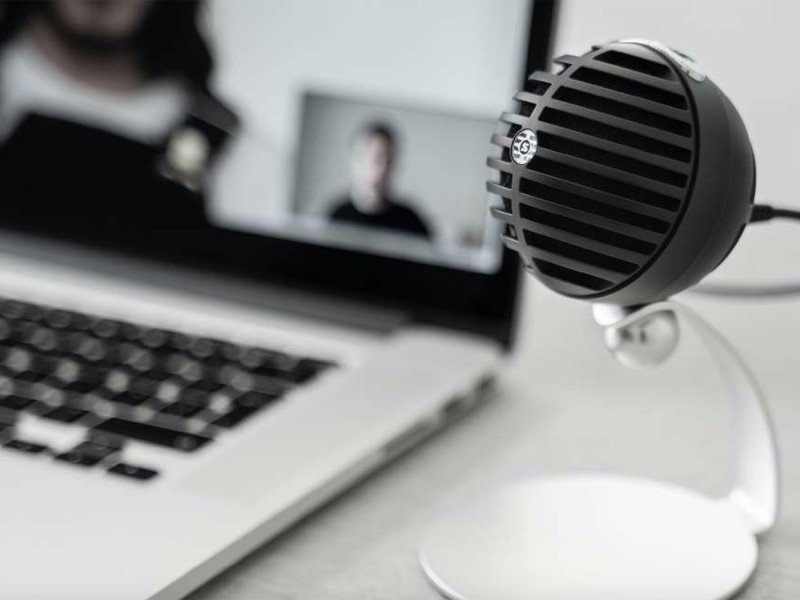
COVID-19 has reshaped the ways some of the same tech that would usually be promoted in booths at CES, like laptops, computers, monitors, wireless routers, and other peripherals, are presented. Now, it's in the context of how they can benefit you in a working from home or virtual learning environment. Not only are the same types of devices being shown, but there's an increased attention on gear like webcams and lighting, headsets and headphones, portable microphones, and networking cables. The Shure MV5C Home Office Microphone is a great example – though it isn't a brand-new product, the company is promoting it at CES. And even its name screams work-from-home!
Smart home gear has always been popular at CES, and this year, that's more than ever as people look for ways to not necessarily automate tasks, but be able to enjoy things like music around the house and access to streaming services from every TV in the home.
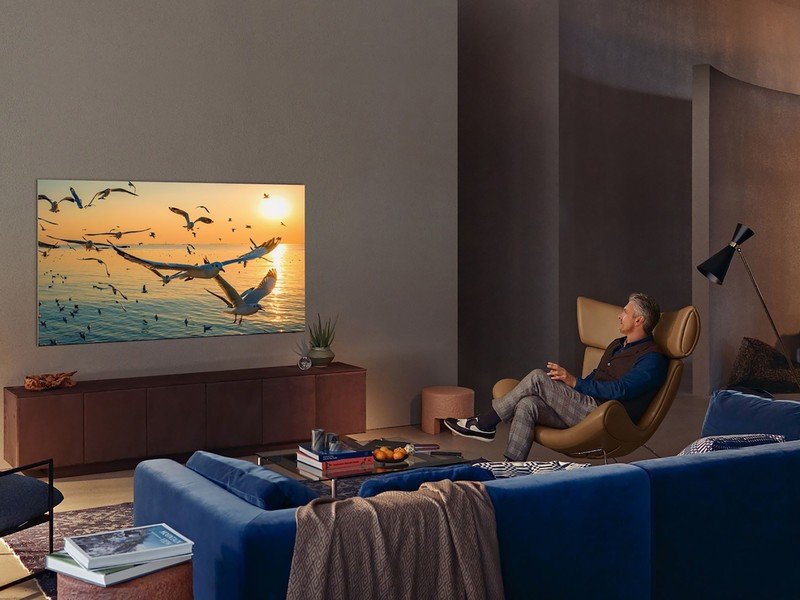
Essentially, all of the typical categories of products you'd see at CES, from televisions to fitness gear, speakers, small appliances, and more, simply have the "at home" moniker attached to them: here's how you can exercise at home using your television; here's how you can get laundry done more quickly at home; here's how you can access all of your favorites shows for binge-watching…at home. You get the picture.
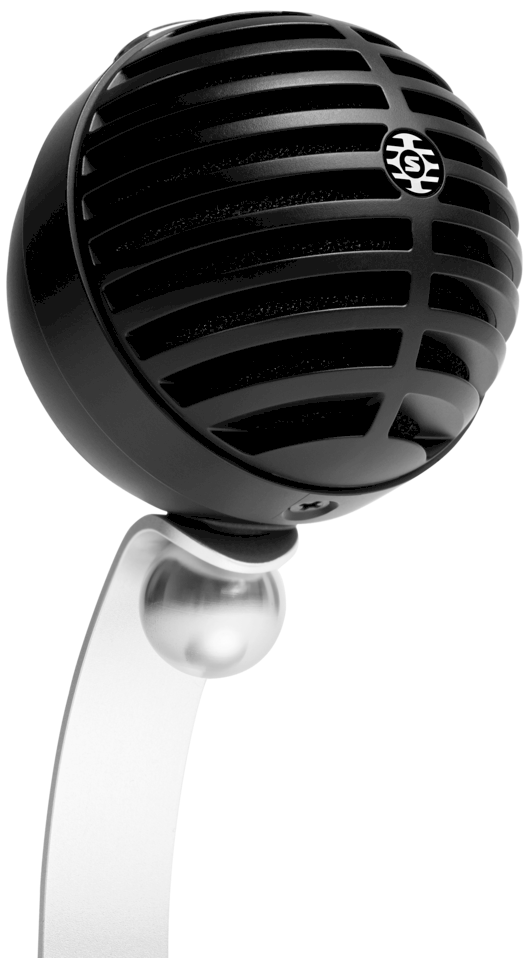
Improve your sound
Whether you're leading a virtual presentation, recording content, or talking live with colleagues, clients, friends, or family, this portable microphone is designed to improve the sound of your voice so it's more intelligible while also minimizing reverberations. Use it with a PC or Mac to get improved sound quality. Easy to set up, it's powered by USB and works with all of the most popular video conferencing software, including Zoom, Google Meet, and Microsoft Teams.
Other ways CES is being reshaped due to COVID-19
A big part of CES 2021 is not only the virtual exhibits and "booths," but also the keynote speeches, conference sessions, interviews, and pointed discussions. These are a lot easier to "attend" virtually since there are no line-ups nor logistical issues in getting from one to the next in a short span of time. (Though there have admittedly been sporadic technical issues).

The themes of these sessions, a mainstay of CES, have always changed annually based on the current state of the industry and predicted future trends. And this year, COVID-19 had a major impact on the topics. They included ones like "The Digital Transformation of Personal Wellness" and "Eat, Drink, Play, Pay: Will We Ever be the Same?", and even more blatantly obvious pandemic-influenced seminars with titles like "COVID-19 State of the Union" and "Digital Health in 2020: Rules of Contagion." Even discussions that weren't specific to COVID-19, like ones about the growth in streaming television or developments in AI, discussed trends that have been directly influenced by the pandemic.
Meanwhile, topics that have been growing in interest over the past few years are enjoying accelerated attention due to COVID-19, like voice technology and assistants. It's no longer just convenient to have a touchless faucet, toilet, lights, and door handles, it's an essential need, particularly in public venues.
Is CES forever changed?
Fingers and toes are crossed that CES will return to its usual set-up in January 2022. Despite how much we loathe paying the exorbitant Las Vegas hotel fees, regret drinking too much and staying out too late, and inevitably work ourselves to exhaustion, it's tough not to miss the grind.
Will the focus and direction of the show be re-shaped for good? One could argue that CES, which was once upon a time a show focused almost entirely on hi-fi audio, has always been evolving. What was once a small section of automotive tech now occupies an entire area. Categories like the best smartwatches, premium smartphones, and smart home that used to fit in one floor of one hall in the Convention Center was moved to an entirely different convention area a few years ago to accommodate the exploding growth. Technologies that we never imagined would be at CES have become primary parts of the show.
Will masks, air purifiers, sanitizing products, and other related gear, follow that same trajectory? Will working from home tech gear become a central demo next year? It's possible, and probably likely. Even when COVID-19 is under control, the way we work, play, and live may forever be changed. We have become more cognizant of not spreading germs or breathing in polluted air and have gotten used to new ways of doing things, whether it's setting up a home office or finding more creative ways to spend time with loved ones at home.
If health tech at CES can offer solutions that help us improve our overall health and well-being, it's an area that's well worth continuing to focus on at the show, not only in the products that are on display and the sessions that are held, but also in the way we approach our interactions once we can go back to being there in person.

Christine Persaud has been writing about tech since long before the smartphone was even a "thing." When she isn't writing, she's working on her latest fitness program, binging a new TV series, tinkering with tech gadgets she's reviewing, or spending time with family and friends. A self-professed TV nerd, lover of red wine, and passionate home cook, she's immersed in tech in every facet of her life. Follow her at @christineTechCA.
